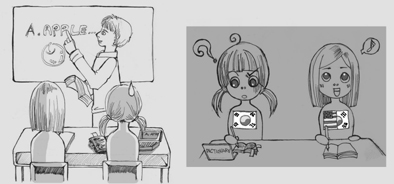
Starting from those students who entered Ewha in 2007, Ewha has required students to take at least four classes taught in English during their four years of university as a part of its Global Ewha 2010 project. However, students’ attitude toward classes in English indicates that the administrative requirement is not producing the result that it had intended. Students are hesitant to take classes conducted in English and have trouble following those courses due to language barriers existing for both students and professors. Some students also question whether Ewha is rushing ahead too fast, without taking the English proficiency level of students into account when implementing policies regarding classes taught in English.
According to a survey that the Ewha Voice conducted among 162 students, 49 percent had already taken classes in English while 51 percent had not taken any, excluding English I, II, III and IV which are classes designed solely for the purpose of English language education. The survey showed that the main reason that students have avoided taking classes in English was because they were uncertain about how much they could actually understand in those classes.
“I am not used to learning a subject taught in English and when it comes to learning a major subject, it will be more difficult for me to study the subject because it will take more time to study all the principles and terminology in English,” said Park Eun-hyung (Political Science & Diplomacy, 2), who has not yet taken any classes conducted in English.
Among students who took at least one class in English, 40 percent said that they felt difficulty understanding the class. Also, 29 percent said that they were unable to get as high a grade as they wanted because of other students who were more fluent in English, “I took an elective course because the school informed students that they would give more As and Bs in classes taught in English than in other classes conducted in Korean. However, the grades were mainly based on the speaking and discussion, with many students fluent in English present. So, unfortunately, I had no choice but to drop the course,” said one Political Science & Diplomacy major student who wishes to remain anonymous.
Professors who are also aware of these feelings among students have applied different methods to overcome the problems their students encounter. “I know students taking my class have trouble understanding mathematical terminology in English. So I give students a book with explanations of the mathematical terms in English in advance. Also, I try to choose easy words that the majority of students will understand during the class,” said Professor Yoon Jeong-ho (Mathematics).
Professor Vladimir Hlasny (Economics) encourages students to challenge themselves to keep up with courses taught in English. “It is sad to see students who struggle with English in my class dropping out, giving up and failing the class. So, at the beginning of semester, I try to watch for signs of these kinds of students, and try to induce them to talk to me about their troubles,” said Hlasny.
Another way that has been suggested to overcome the problem of students avoiding classes taught in English is to divide classes into various levels. “It is important to take students’ English proficiency into consideration when the school opens a class taught in English. I think the school should set a restriction so that native speakers in English cannot take the same classes as students who are not native speakers in English,” said Na Bo-ra (English Education, 2). “Also, a limit should be set on how many students can attend the class, since if there are fewer students in one class, students can easily participate in class and interact with a professor in English.”
Another idea is to offer a course on how to effectively take classes taught in English. “Courses that teach the basic skills needed to take classes in English efficiently, and a teaching assistant who can help us fully understand what a professor teaches, will be helpful for us,” said Bang.
“Contrary to classes conducted in Korean, there is not as much feedback or evaluation of English-taught classes. Lack of information about these classes makes students hesitate to take them. So there should be a space where students can evaluate these classes and see the evaluations,” said Lee Dong-ju (Political Science & Diplomacy, 2).
Universities like
However, not all problems can be traced to the students. The English proficiency of the professors is also an issue. A student who wanted to remain anonymous pointed out that due to one professor’s poor pronunciation students were not able to understand what he was saying during a class last semester. She added, “An exchange student dropped that course because she could not understand what the professor was saying because of bad pronunciation.” Another student who also wanted to remain anonymous said, “When I took a class taught in English, the professor did not have the ability to explain difficult theories in English. So it was hard for me to study that subject.”
Bang Seong-hyun (International Office Management, 2) said “Instead of just forcing students to take classes in English, the school should find a way to help students improve their English ability. I think both students and professors are not yet ready for classes taught in English.”

